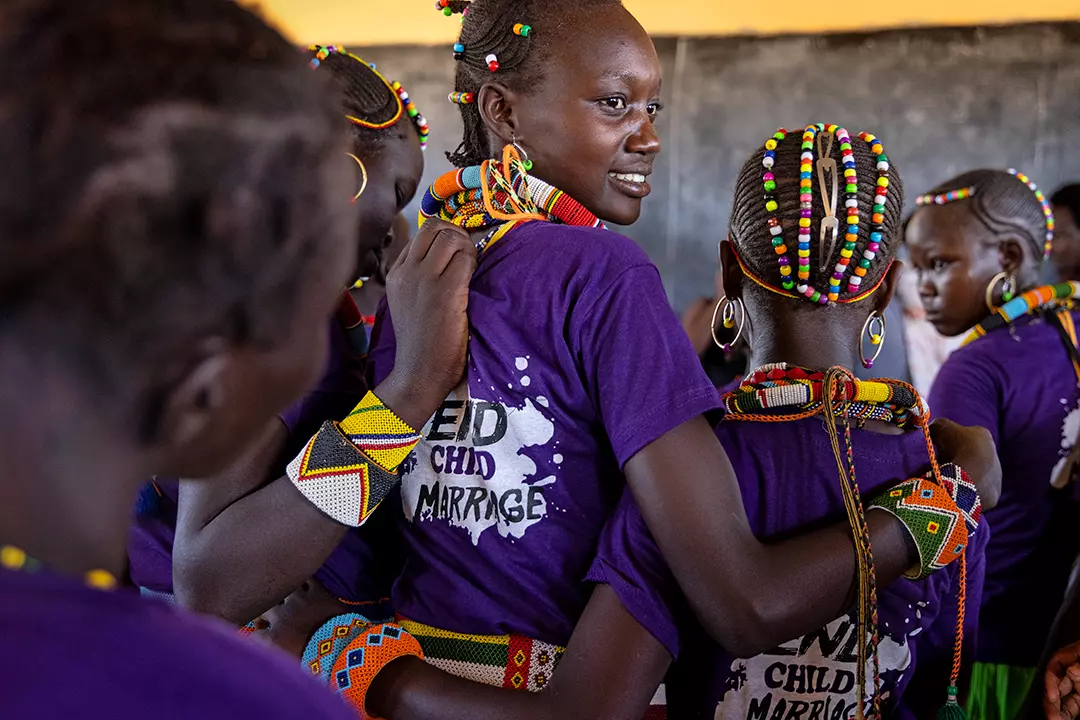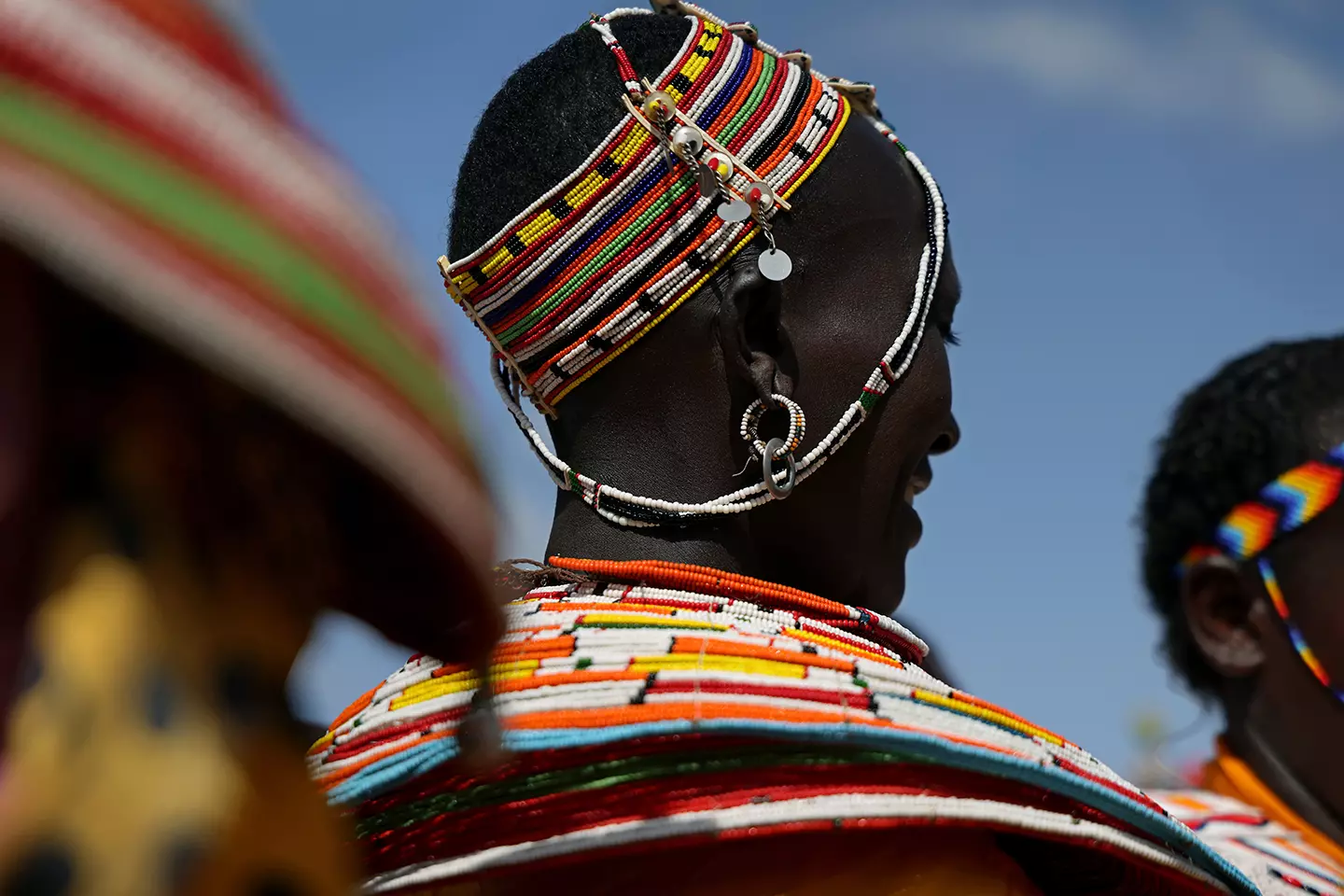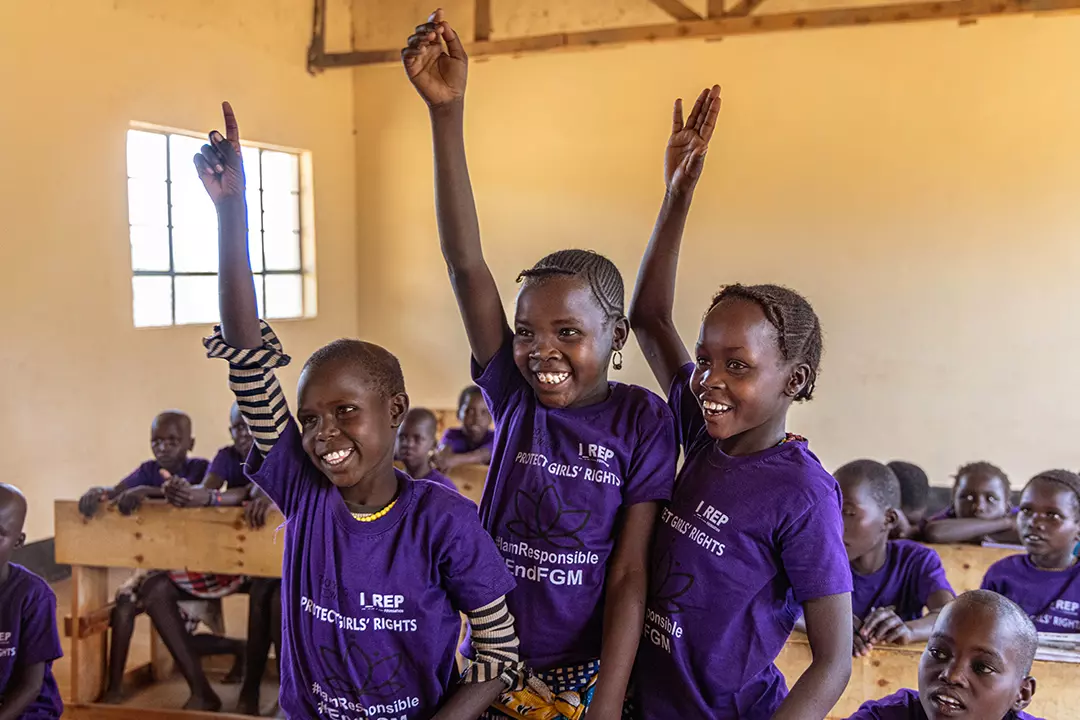
Veronica, 14, celebrates the opening of TYTW's Shepherd School with her classmates. "I am happy for the education given to us. I am so happy." Photo by Stephanie Sinclair.
TYTW has worked in Kenya since 2014, engaging key decision-makers to better protect girls, while supporting 1500 historically excluded girls directly with crisis services, innovative champion-building workshops, multiyear leadership scholarships, and ongoing public awareness campaigns that elevate and center survivor voices.
Although the Kenyan government has set the legal age of marriage at 18, child marriage is still rampant in certain communities and fueled by harmful gender and social norms, including existing traditional practices leading to poor reproductive health outcomes. In the most remote counties of Kenya, such as Samburu County, girls experience life-altering events at some of the highest rates- with 86% undergoing FGM, 50% being married off as children, and 62% becoming teen mothers (UNFPA, 2020).


A young Samburu woman in Ngilai village joins a celebratory ceremony in support of the Butterfly Project. Photo by Stephanie Sinclair.
Internationally known for their beautiful and colorful adornment, attire and hairstyles, the Samburu community are sometimes referred to as 'The Butterfly People'. The symbolic and culturally-inspired project name has been aptly chosen by the deserving girls at the center of this project: a suite of community-based investments in girls’ protective social, educational, health, and economic assets.
The Butterfly Project’s main goal is to reduce gender disparity among historically excluded girls, beginning at age 9, who are at risk of child marriage, FGM and other harmful practices in Samburu County, with the support of families and the greater Wamba North community.
The project offers a suite of community-based investments in girls’ protective social, educational, health, and economic assets, comprising local day school scholarships or evening literacy/numeracy classes (supported by solar power); curriculum-based mentoring; community dialogue/family agreements; livestock and nutrition provisions; and economic empowerment. TYTW utilizes the Population Council Financial Literacy curriculum as an entry point, while offering contextualized life skills and sexual/reproductive health lessons through games, music and instruction during weekly meetings.
The Parental and Community Dialogue project component leverages traditional Samburu norms of honesty, kindness, and upholding the sanctity of one’s word to engage parents and extended family members, sharing key information and resources on the communal responsibility to protect girls from gender-based violence. Parents and community members taking part in the sensitization sessions are equipped and held accountable for preventing these practices from happening within their families. For girls to receive scholarship support, parents are required to sign agreements pledging to prevent harmful practices from happening within their households. TYTW has employed incentive-supported family agreements in Samburu in the recent past with a near 100% success rate amongst project beneficiaries.
TYTW works to battle education injustice and child marriage in West Pokot County, Kenya, one of the counties where education is not readibly accessible to the majority of the population. A 2007 analysis by the Ministry indicated that only 53.4% of all persons aged six and above have ever enrolled in school, while only 4.5% (with 1.8% women) having attended secondary schooling. Only 0.6% of the population has attended any post-secondary institutions (KNBS, 2008). In Kotulpogh village, one of the most remote pastoralist areas of Kenya, close to 100% of the population does not have the ability to read and write, and rates of child marriage and FGM are estimated at nearly 100% as well.
Earlier this year, in Kotulpogh village of West Pokot County, TYTW, in collaboration with premier sponsor World of Women and implementing partner I_Rep Foundation, launched the area’s first Shepherd School, providing education to hundreds of girls who have not enjoyed this right before. This special school program will focus on building literacy and numeracy proficiencies, providing children with access to foundational skills and knowledge that will bring lasting empowerment and opportunities.
The “shepherd school” offers both daytime and evening sessions to accommodate pastoralist girls whose daytime hours are often consumed with agricultural duties. The program brings first-time educational opportunities to two groups of girls, ages 7-12, and 12-17. Lessons focus on literacy and numeracy, opening doors to foundational skills and knowledge that will bring lasting empowerment to an area where the illiteracy rate is close to 100%, and rates of child marriage and FGM are equally high.
Before this initiative, the closest school was more than 50 kilometers away, even though the families in the village were extremely eager to educate their children.
Keeping girls in school is the single most effective preventative measure against child marriage.

TYTW works in Nyahururu, Kenya to provide a computer coding program for early secondary school girls, keeping them in school and protected from harmful practices like child marriage and FGM. The coding program is designed to grow their confidence, their critical thinking abilities, and to equip them with opportunities for employment in a growing technological world.
Helping girls enter into STEM fields will greatly improve their work opportunities, and help narrow the pay gap between men and women. The benefits of these early secondary school programs impact more than just job opportunities. Earlier classes help girls feel more comfortable generally around computers, math and technology; early classes encourage girls to pursue later classes in college; STEM has been shown to improve problem solving, and critical and analytical thinking, so girls become better problem solvers. And yes, girls have better career options. As technology transforms the job market worldwide, we are preparing the girls of Kenya to keep up and to be competitive in a fast moving area.
TYTW’s Leadership Scholarship program supports girls at-risk for and survivors of child marriage, and creates pathways for them to thrive. In having access to sustained education, the girls become the voices of change in their communities.
In partnership with I_Rep Foundation, TYTW supports the Ortum Girls Center, a safehouse dedicated to protecting girls who are survivors of or at risk for child marriage, FGM, and other harmful traditional practices such as beading.
